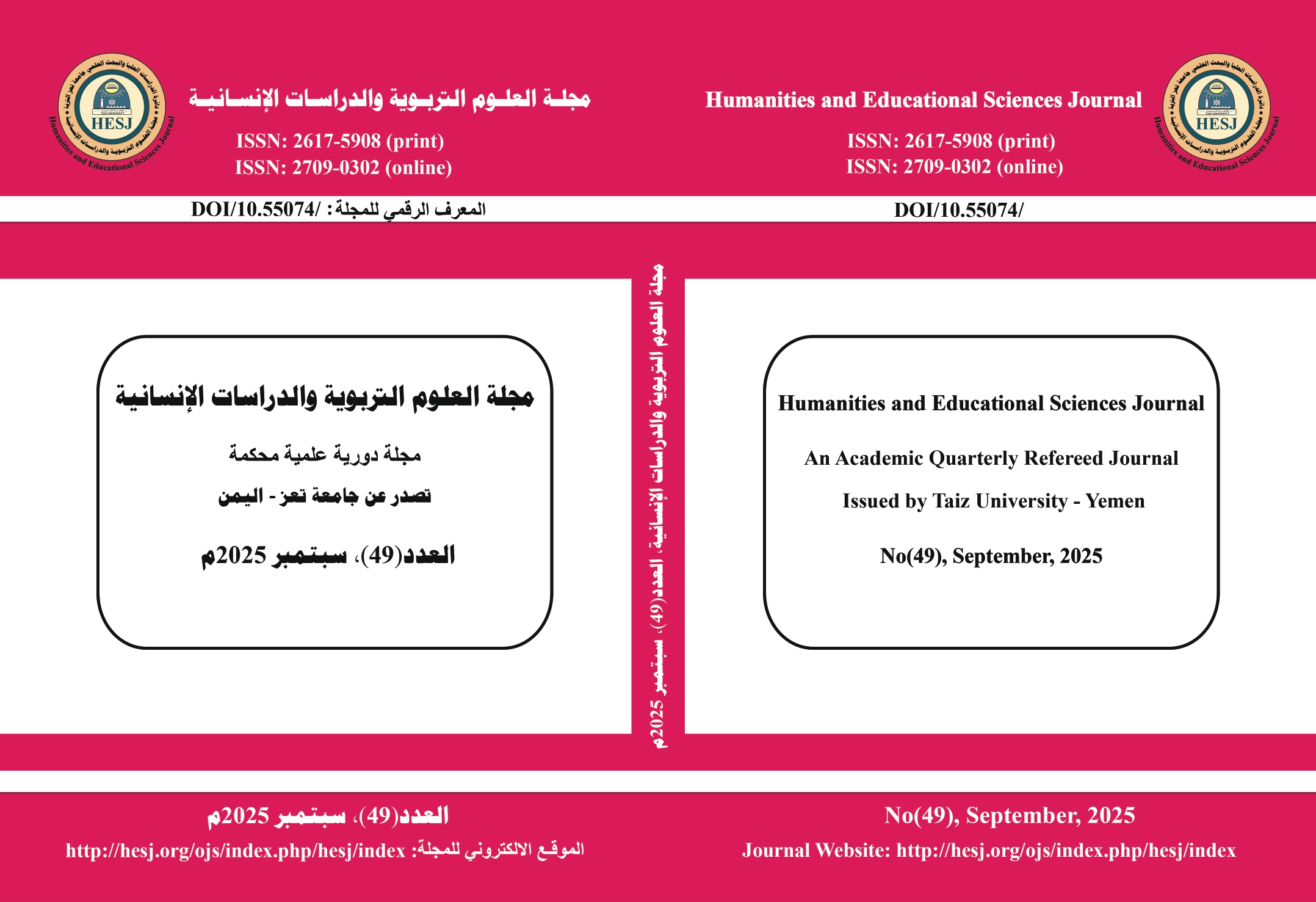Bridging Emic and Etic Readings: Idiom Translation Strategies in Yusuf Idris's The Cheapest Nights
DOI:
https://doi.org/10.55074/hesj.vi49.1570الكلمات المفتاحية:
Emic، etic، culture-specific expressions (CSEs)، idioms، deep-structure meaning، surface-structure culturemesالملخص
This study is an attempt to approach the translation of idiomatic expression in some of Yusuf Idris's short stories into English language from an emic-etic perspective. This study aims to investigate if the translator (a native Egyptian-Arabic speaker) succeeded or failed to represent the cultural implications of this category of culture-specific expressions, namely idiomatic expressions. A descriptive, comparative analytical approach is used to figure out the cultural meanings conveyed or lost in the ST. The idioms and their translations are tabulated along with translation strategies utilized to get insight into what strategies were suitable so far as cultural meanings of idioms are concerned. The results of the study showed that the translator succeeded to represent the deep-structure meaning (the communicative meaning) of 14 out of 19 idioms, but failed to account for their surface-structure emics, which are insignificant in a communication process but imbued with cultural connotations like anecdotic, historic meanings or community worldviews. The translation strategies of adaptation and paraphrasing proved useful in rendering communicative meanings; culture-related surface-structure meanings (surface-structure culturemes) remained in the dark corner. The other five expressions in the data are omitted in the TT.المراجع
Ahmad, M., & Mahadi, T. (2012). Strategies of translating idioms from Arabic into English and vice versa. Journal of american Arabic Academy for Sciences and technology, 3(6), 139-147.
Almaaytah, S. (2022). Translation of idiomatic expressions from Arabic into English using AI (Artificial Intelligence). Jounal of Positive School Spychology, 6(4), 8839-8846.
Al-Masri, H. (2009). translation and cultural equivalence: A study of translation losses in Arabic language. Jordan Journal of Modern Languages and Translation, 7-44.
Al-Masri, H. (2017). The influence of the translator's linguistic/cultural background on crucial equivalence. Linguistic Applied, 6, 11-24.
Ameen, A. (2013). Dictionary of Egyptian customs, traditions and expressions. Cairo, Egypt: Hindawi.
Baker, M. (1992). In other words: A course book in translation. London: Routledge.
Cambridge University Press. (n. d.). All-and-asundry. In Cambridge Dictionary. https://dictionary.cambridge.org/dictionary/english/all-and-asundry.
Cambridge University Press. (n. d.). Make-a-monkey-out. In Cambridge Dictionary. https://dictionary.cambridge.org/dictionary/english/Make-a-monkey-out.
Cambridge University Press. (n. d.). Make-both-ends-meet. In Cambridge Dictionary. https://dictionary.cambridge.org/dictionary/english/Make-both-ends-meet.
Cambridge University Press. (n. d.). Shameless. In Cambridge Dictionary. https://dictionary.cambridge.org/dictionary/english/shameless.
Davies, E. (2003). A Goblin or a dirty nose? The treatment of culture-specific references in translations of Harry Potter Book. In The Translator, 6, 65-100.
Harris, M. (1964). The nature of cultural things. New York: Random House.
Headland, T. (1990). Introduction: A dialogue between Kenneth Pike and Marvin Harris on emics and etics. In T. Headland, K. Pike, & M. Harris (Eds.), Emics and etics: The insider/outsider debate (pp. 13-27). London and New Delhi: SAGE Publications.
Idris, Y. (2017). Arkhas layāli. UK: Hindawi.
Idris, Y. (2017). Hadithat sharaf. UK: Hindawi.
Idris, Y. (2020). The cheapest nights. (W. Wassef, Trans.) Penguin Books.
Idris, Y. (2021). Al-a'mal alqaṣaṣīya al-kamila. Al-Giza, Egypt: Nahdhat Misr.
King James Bible. (1769/2017). King James Bible Online. https://www.kingjamesbibleonline.org.
Meriam Webster. (n.d.). Idiom. In Merriam-Webster.com.dictionary. Retrieved July 5, 2025, from http://www.merriam-webster.com/dictionary/idiom.
Meriam Webster. (n.d.). I-wash-my-hands. In Merriam-Webster.com.dictionary. Retrieved July 5, 2025, from http://www.merriam-webster.com/dictionary/I-wash-my-hands.
Meriam-Webster (n.d.). Make-the-laughing-stock-of. In Merriam-Webster.com.dictionary. Retrieved July 5, 2025, from http://www.merriam-webster.com/dictionary/Make-the-laughing-stock-of
Meriam-Webster (n.d.). Make-a-monkey-out-of. In Merriam-Webster.com.dictionary. Retrieved July 5, 2025, from http://www.merriam-webster.com/dictionary/make-a-monkey-out-of.
Meriam-Webster (n.d.). Make-both-ends-meet. In Merriam-Webster.com.dictionary. Retrieved July 8, 2025, from http://www.merriam-webster.com/dictionary/make-both-ends-meet.
Meriam-Webster (n.d.). Miser. In Merriam-Webster.com.dictionary. Retrieved July 5, 2025, from http://www.merriam-webster.com/dictionary/miser.
Newmark, P. (1988). A textbook of translation. Shanghi Foreign Language Education Press.
Newmark, P. (1991). About translation. Cleven: Multilingual Matters Ltd.
OUALIF, M. (2017). Translating idiomatic expressions from English into Arabic: Difficultues and strategies. Arab World English Jounal, 1(3), 22-31. doi: http://dx.doi.org/10.24093/awejtls /vol1no.3.2
Pedersen, V. (1988). Essays on translation studies in business language. Copenhagen: Erhverus økonon. SIC Forlag.
Pike, K. (1967). Language in relation to a unified theory of the structure of human behavior. Paris: Mouton & Co.
Pike, K. (1990). On the emics and etics of Pike and Harris. In T. Headland, K. Pike, & M. Harris (Eds.), Emics and etics: The insider/outsider debate (Vol. 7, pp. 28-47). London and New Delhi: SAGE Publications.
Rohmawati, I., Junining, E., & Suwarso, N. (2022). The idioms and culture-specific items translation strategy for a classic novel. Journal of English Language and Pedagogy, 5(2), 169-181.
Strassler, J. (1982). Idioms in English: A pragmatic analysis. Gunter Nar Verlag Tubingen.
Vinay, J. P., & Darbelnet, J. (1995). Comparative stylistics of French and English: A methodology of translation. (J. C. Sager, M. -J. Hamel, Eds., J. C. Sager, & M.-J. Hamel, Trans.) Amesterdam & Philadephia: John Publishing Co. Retrieved from.
Vula, E., & Tyfekçi , N. (2024, March). Navigating non-literal language: The complexities of translating idioms across cultural boundaries. Academic Jounal of Interdisciplinary Studies, 13(3), 284-307.
















